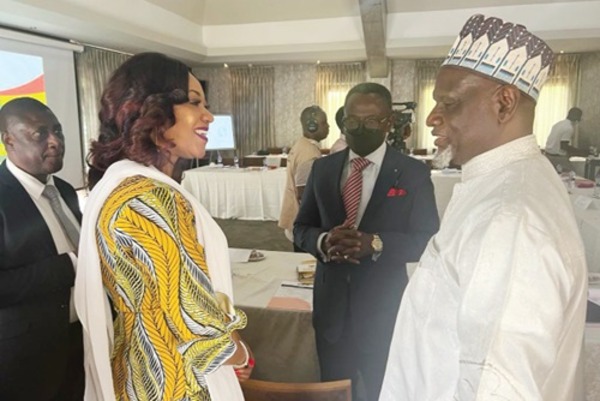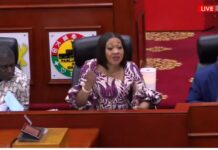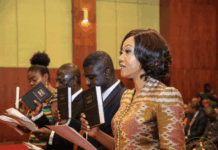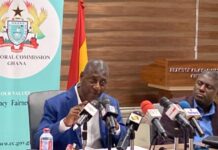
More than 66,000 people are vying for Assembly and Unit Committee positions in the upcoming District Level Elections (DLEs), slated for Tuesday, December 19, 2023.
Statistics sourced from the Electoral Commission (EC) indicate that the contestants are made up of 18,755 assembly member candidates and 47,502-unit committee member candidates, bringing the number to 66,257 candidates.
They will be seeking election in 6,215 electoral areas across the 216 metropolitan, municipal and district assemblies (MMDAs).
Out of the 18,755 candidates vying to become assembly members, 6,215 will be elected to serve in the 216 MMDAs, in accordance with section 5(1)(b) of the Local Government Act, 1993 (Act 462).
For the unit committee members, 31,075 will be elected out of the 47,502, given that each electoral area has five-unit committee members.
A breakdown of the numbers shows that the Ashanti Region has the highest number of contestants in the DLEs, with 3,794 persons vying for assembly membership in 1,087 electoral areas.
This is followed by the Eastern Region with 2,685 aspirants in 852 electoral areas; the Central Region with 1,634 contestants in 572 electoral areas, and the Volta Region with 1,398 aspirants in 447 electoral areas.
The Greater Accra Region completes the list of top five regions with the highest number of assembly member aspirants as 1,346 people are eyeing seats in 422 electoral areas.
Two other regions that have more than 1,000 aspirants each for the assembly member slots are the Western and Northern regions, which have 1,197 and 1,074 aspirants in 363 and 421 electoral areas respectively.
In the Upper East Region, 939 persons are contesting the assembly member position in 359 electoral areas, while 877 are also battling it out in 322 electoral areas in the Bono Region.
Relatedly, there are 730 assembly member aspirants in 293 electoral areas in the Upper West Region; 664 in 226 electoral areas in the Bono East; 628 in 213 electoral areas in the Oti Region, and 575 in 185 electoral areas in the Western North Region.
The Ahafo, Savannah and North East regions have the least number of assembly member aspirants, with 450 in 169 electoral areas, 397 in 152 electoral areas and 373 in 132 electoral areas respectively.
Jasikan, Guan districts
Meanwhile, the EC has confirmed that the DLEs will also be conducted in the Jasikan and Guan districts in the Oti Region on December 19.
When the EC received nominations from aspirants on November 16 and 17 of this year, the two districts were not part of them because the Constitutional Instrument (C.I) 119 (to be amended), which was laid before Parliament, had not matured.
However, in a press statement signed by the acting Head of Public Affairs, Michael Boadu, the EC said following the passage of the C.I. and in accordance with the District Level Elections Regulations 2015 (C.I. 89), the DLEs would be conducted in the two districts, together with the other districts.
Active participation
Ahead of the elections, the Chairperson of the National Commission for Civic Education (NCCE), Kathleen Addy, has urged eligible voters to participate actively in the exercise.
She said it was worrying that the DLEs were often characterised by low turnout by voters.
She stressed that prioritisation of the DLE would ensure that the best people were elected to promote good governance at the local level.
“Members of Parliament live and work in Accra; the President’s Office is in Accra; but the assembly and unit committee members live with us in the community and help to address our daily development challenges,” she said.
The Minister of Local Government, Decentralisation and Rural Development, Dan Botwe, urged the electorate to fully participate in the elections to improve turnout.
“We know the turnout for DLEs in the country in previous years has been extremely low, but we are targeting at least 50 per cent turnout this time around, and we want all, irrespective of party affiliation, to go to the polls in their numbers on the day to cast their ballot,” he said.
Mr Botwe said it was time for Ghanaians to change their perception of the DLE and ensure that they took full interest in the exercise to elect persons who would help champion their cause at the local level.
For his part, the Head of Local Government Service (LGS), Dr Nana Ato Arthur, said given that the MMDAs formed the bedrock for the decentralisation of governance, it was important for all Ghanaians to be interested in how the assembly members were elected.
Therefore, he called on all stakeholders to play their roles well to ensure that the DLE of December 19 was successful.
Background
The DLEs are meant to elect assembly members and unit community members at designated electoral areas at MMDAs.
The elections are in accordance with the Local Government Act, 1993 (Act 462), which provides for the election of assembly members to MMDAs.
Section 5(3) of Act 462 states: “Elections to a district assembly shall be held once every four years, at least six months before or after a general election of Members of Parliament.”
Section 6(1) of Act 462 also provides that for a person to qualify to be elected as a member of a district assembly, the person must be a citizen of Ghana above 18 years, a registered voter, ordinarily resident in the district they are seeking election, and also be a taxpayer.
The assembly members are to serve as the representatives of the communities while the unit committee members also help in mobilisation at the community level.
Over the years, the DLEs have been characterised by low patronage, with a national average turnout of 30 per cent.
ALSO READ:






